The Great Life And Painful End Of Emperor Julius Caesar
Built a great career, being one of the most influential figures in world history, but Julius Caesar had to suffer a cruel end.
In the history of the ancient world, there were extremely outstanding leaders with a strategic mind and the ability to defeat all enemies. Among the most talented kings in the world, it is impossible not to mention Julius Caesar.
Julius Caesar was a brilliant politician who introduced a series of reformist rules that laid the important foundation for the transition of the Roman Republic to the new political system of the Roman Empire. But first of all, he was an outstanding military commander.
Battle of Pharsalus
One of his most famous battles was the Battle of Pharsalus in the Roman Civil War. Caesar's opponent was Pompey - a former ally and also a recipient of the support of the Senate. The battle showed Caesar's military skills, making him a glorious winner despite having fewer soldiers.
Pompey arranged a large but inexperienced infantry force into a thick formation in front. He thought that this way of placing soldiers would help them be more stable when fighting. Pompey's right flank stood on the banks of the River Enipeus, so he was more reassured and had his horsemen stand on the left.
Pompey intended to use 7,000 cavalry to destroy Caesar's advance, then went around the back to attack the infantry. But this plan didn't work as Caesar heavily deployed on the right flank, where there was a high risk of attack and placed 5,000 infantry behind the cavalry front.
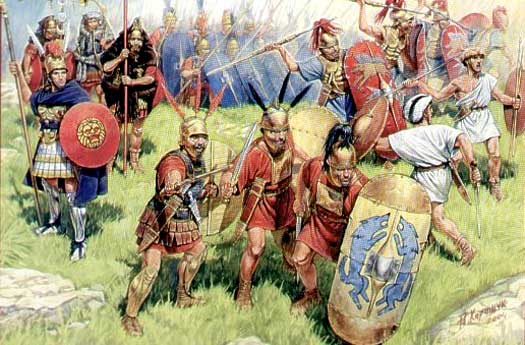
One of Caesar's most famous battles was the battle of Pharsalus against Pompey.
The battle began with infantry on both sides fighting in the center. Thanks to the advantage of having many soldiers, Pompey's cavalry overwhelmed Caesar's and stormed into the infantry behind. As Pompey's cavalry split up to fight in small squads, Caesar saw this as an opportunity to strike. He suddenly gave the order to throw the javelin at the enemy. The sudden attack left Pompey's cavalry wounded and scattered.
This left Pompey's vulnerable forces of archers and stoners open. Caesar continued to send his troops up, prompting Pompey to send his cavalry on the left flank to support. Finally, after Pompey had gathered all his forces and had no more reserves, Caesar threw his last army into battle and won.
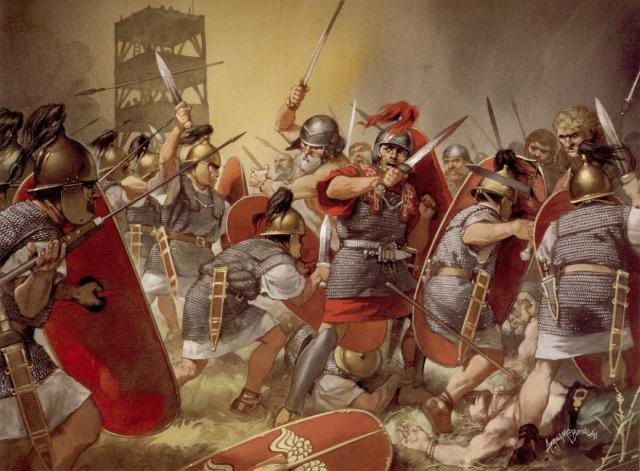
Thanks to his commanding skills, Caesar won the battle despite being outnumbered in soldier number.
This is just a typical victory for Caesar - who is considered one of the greatest military men in history for laying the foundations of the Roman Empire. His life and painful death have long been the subject of many literary works and films.
Alliance of the Triumvirate
Julius Caesar was born into a famous but not wealthy family in Rome in 100 BC. Coming of age, he joined the army, set off for Asia and Cilicia. When Sulla, the supreme leader of Rome at the time died, Caesar returned and began a political career.
Caesar's position was strengthened in 74 BC when he assembled his own army and fought Mithradates VI Eupator, king of Pontus, who declared war on Rome. Caesar began working with the famous politician Pompey and soon went on to hold many other important positions in the government and remained in close alliance with Pompey. At the same time, Caesar also allied with Crassus, a successful Roman general and politician in the time of Sulla.
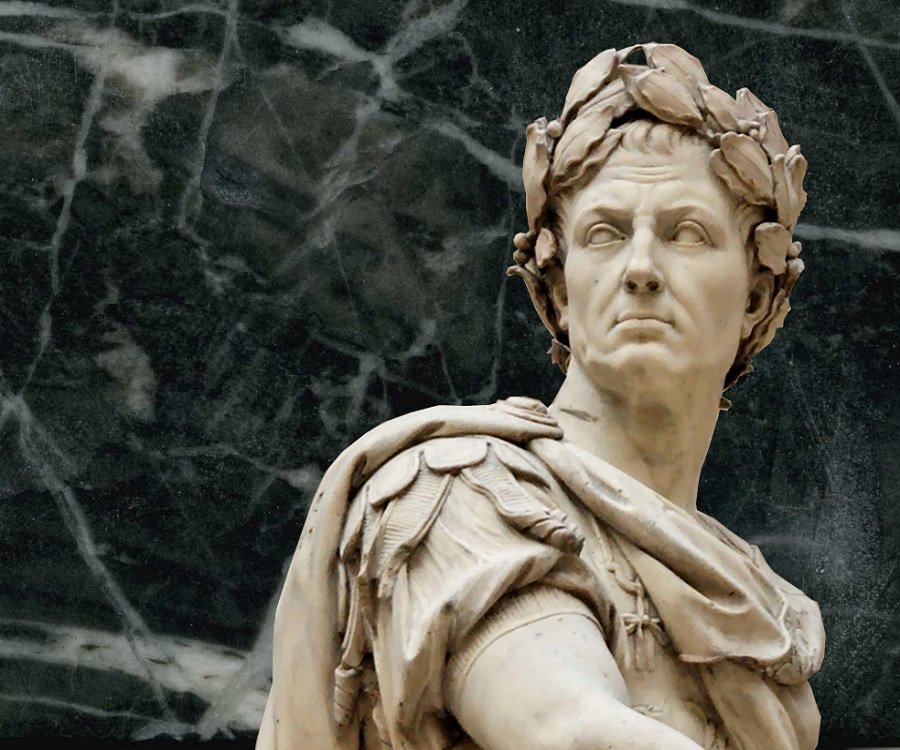
Statue of Julius Caesar
Caesar, Pompey and Crassus then formed the famous First Triumvirate in Roman history, which had an unofficial but huge role in politics. Although Crassus and Pompey were strong opponents, Caesar demonstrated excellent negotiation skills and earned their trust. He convinced them that it was better to be an ally than an adversary.
For Caesar, the First Triumvirate was the perfect foundation for his ambitions for greater domination. Crassus - the richest man in Roman history - requested financial support for Caesar in his "advancement" path.
CustomsPig Canvas Julius Caesar
Talented military man
Starting out as a military man, Caesar never forgot the importance of conquests. He left Rome and arrived in Gaul (now France and Belgium) in 58 BC. He defeated the tribes here and began stationing troops to protect the border.
When the German tribes were about to invade Gaul, Caesar built a bridge over the Rhine, marching in a show of force. But then, he led his army back and broke the bridge. The German understood the message that Caesar wanted to send and never dared to attack.
In 52 BC, he officially defeated the leader of Gaul and became its ruler. This allowed Caesar to build up a larger army and begin to carry out military operations to strengthen his position. At that time, Caesar wanted to become one of the greatest leaders of Rome.
Caesar possessed many qualities of a brilliant leader. He always showed respect to his troops and was very good at communicating with them. He encouraged the military to decorate their own personal weapons, which made them proud and distinguished.
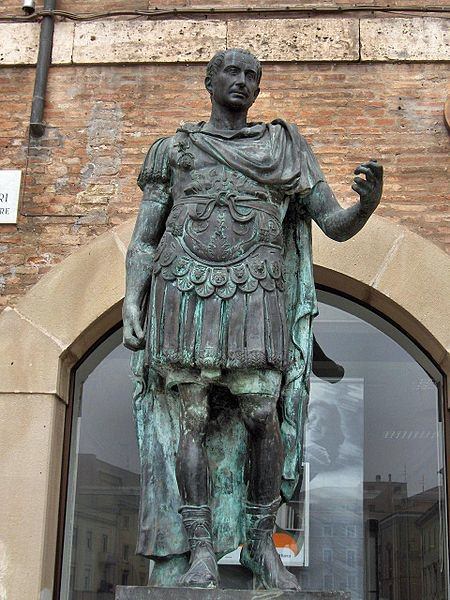
Statue of Caesar in Rimini, Italy today
Historian Suetonius once said that when going to battle, Caesar was always at the forefront of the army: "He always led the army, often walking rather than riding."
At the age of 41, Caesar was also the most skillful swordsman and cavalryman, with incredible endurance.
Though very fair to his soldiers, Caesar was equally brutal when it came to punishment. Suetonius writes: "He judged his soldiers by their combat record, not by their morals or social status. Although he ignored their mistakes and never imposed any punishment, he always gave those fugitives or traitors severe punishments.”
Caesar was also very angry with his enemies. He once waited for the enemy to run out of drinking water and asked to cut off the hands of the survivors.
Road to "Emperor"
As Caesar's power and prestige grew, Pompey became jealous. The Triumvirate was turbulent and forced to temporarily resolve the conflict in 56 BC, divided the leadership of each person into separate lands: Caesar continued to own the present lands for 5 years, Crassus took charge of a five-year term in Syria and Pompey had a five-year term in Spain. However, three years later, Crassus was killed in a battle in Syria and the Triumvirate collapsed.
Pompey then allied with the nobility, who saw Caesar as a national threat. At that time, Caesar realized that civil war with Pompey was inevitable. In the end, Pompey's army was no match for Caesar’s. In late 48 BC, Caesar drove Pompey out of Rome, into Egypt. Pompey was killed there and Caesar aligned with the Egyptian queen Cleopatra.
Returning to Rome with glorious victories, Caesar was honored as the leader of Rome and the Father of the Country. Although known today as Emperor Caesar, his official status at that time was supreme leader.
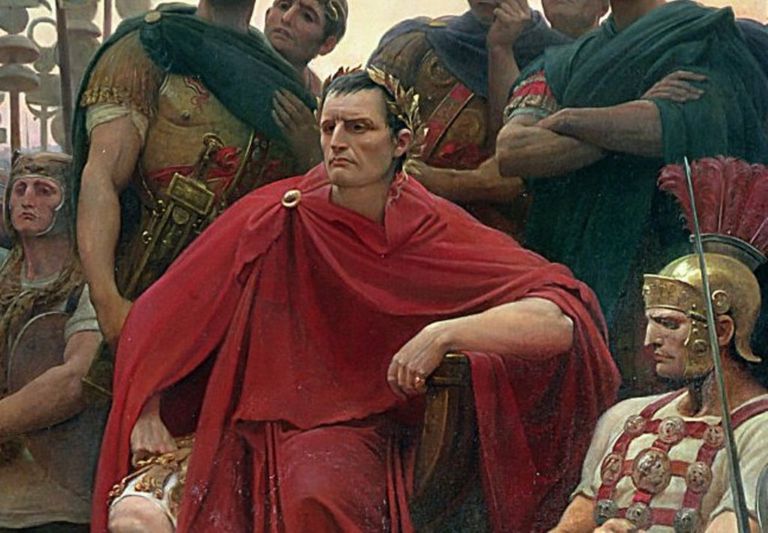
Caesar was made supreme leader of Rome in 44 BC
Caesar introduced a series of reformed Roman rules, laying the foundation for a new political system. He is credited with playing a key role in the transition from the Roman Republic to the Roman Empire:
He reduced debt and reformed the Senate by increasing its size and opening it to the common people.
He revised the Roman calendar to 365 days and restructured local government. He gave citizenship to a few foreigners. Being a wise and tolerant man, Caesar even invited some old opponents to join the government.
At the same time, Caesar was also very careful in consolidating power. He brought many allies into the Senate and asked them to show respect. In council meetings, he had to be the first to speak and the Roman coins must be engraved with his face.
Painful assassination
As Caesar rose to power, he began to be envied and opposed by some members of the Senate.
At the age of 55, Caesar was brutally assassinated. Two senators stabbed him 23 times. Brave to the very end, Caesar said: "It is better to die once than to live constantly in fear of death."
His assassins were later killed and Caesar became the first Roman figure to be sanctified. The Senate gave him the title "The Divine Julius" two years later.
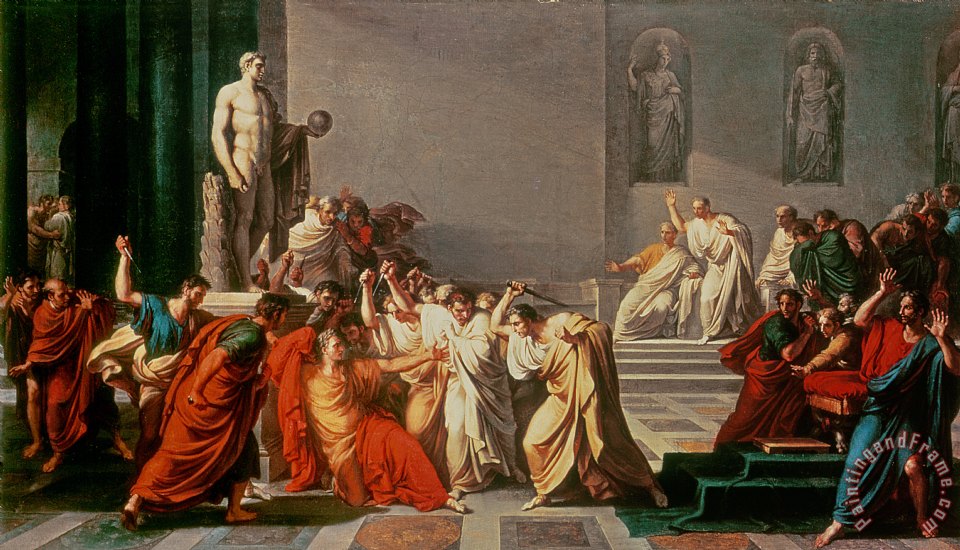
Picture illustrating Caesar's assassination
